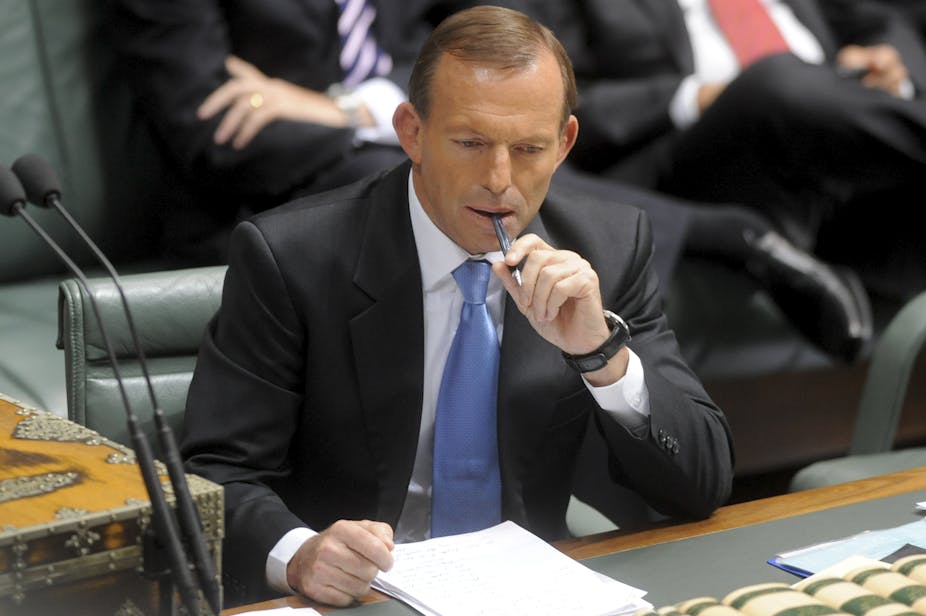Opposition leader Tony Abbott has confirmed he plans to move a motion of no confidence against Julia Gillard’s government in the next two parliamentary sitting weeks.
But in the event a no confidence motion in the Gillard government was successful, what would be the likely result? Convention would require the prime minister either to resign, with her resignation encompassing that of the whole government, or advise the governor-general to dissolve parliament and issue the writs for an election.
As the prime minister would have lost the confidence of the lower house and therefore would have ceased to be a “responsible” adviser, the governor-general would not be obliged to accept her advice to hold an election. The governor-general could, if she thought that a stable responsible government could be formed without an election, choose to appoint the Leader of the Opposition as prime minister instead. This would seem to be unlikely in the current circumstances for two reasons.
A mere vote of no confidence in the Gillard government would not necessarily show confidence in an Abbott government. Unless there was a “constructive” vote - where the House of Representatives not only voted no confidence in the Gillard government but also stated that it had confidence in Abbott to form a government - it is unlikely that the governor-general would have sufficient evidence to support a conclusion that a stable Abbott government could be formed in the current House of Representatives.
It is now also so close to the expiry of parliament that there would be little point in forming a new government when an election needs to be held in the next few months anyway.
The most likely result of a successful vote of no confidence in the Gillard government would be that the prime minister would advise the governor-general to dissolve parliament and hold an election - and that the governor-general would do so.
Two problems would arise, however. The first is that the budget would not yet have passed and that supply would need to be secured before an election was held to ensure that the money did not run out.
It is likely that the governor-general would therefore only accept advice to dissolve parliament on the condition that a temporary supply bill was passed first, so that there was adequate money to fund the public service until a newly elected government could bring down and pass a new budget.
The second problem is that there are strict timetabling rules that then apply, leading to the outcome that only an election for the House of Representatives (and the four Senate seats for the territories) could be held, with a half-Senate election having to be held later. This would double the number of elections to be held.
The timetabling problems are these. The Constitution requires that the writs for the election of the House of Representatives be issued within ten days of its dissolution. Legislation then requires that the nomination date be between ten and 27 days after the date of the writs, and that polling day be between 23 and 31 days after the nomination date.
At most, therefore, the polling day (which must be on a Saturday) can be 68 days after the dissolution of parliament. This would mean that if the vote of no confidence was successful this week (for example, May 16) and the House of Representatives was dissolved, then the general election could at latest be held on July 20.
It is likely, however, that the first valid date for a half-Senate election is Saturday August 3, 2013. This is because s13 of the Constitution requires a half-Senate election to occur within one year before the seats of half the Senate become vacant.

As the High Court has interpreted “election” as covering the whole process from the issue of the writs through to polling and the return of the writs, the writs for a half-Senate election could not safely be issued before July 1 and a half-Senate election could not be held before August 3.
Even if the coalition delayed its vote of no confidence so that the 68 days would nudge over the line to permit a House of Representatives election on August 3 at the same time as a half-Senate election, it would still be the case that the writs for a half-Senate election could not be issued until July 1.
It would arguably be inappropriate for a government that has lost confidence and is in caretaker mode after the dissolution of the House of Representatives to later advise the governor-general to issue writs for a half-Senate election.
The upshot is that a successful vote of no confidence in the government now or in the next few weeks would most likely lead to two separate elections, rather than one. A new government elected in July would then have to face a potential drubbing in a half-Senate election early next year, just at the time that it is putting in place budgetary cut-backs and other potentially unpopular policies.
The Australian people might also be unhappy about the extra cost of running the elections separately and having to come out to vote twice, rather than doing both jobs in the one go in September. One can be pretty confident, therefore, that if the coalition holds a vote of no confidence in the Gillard government this week, it will be secretly hoping to lose it.

